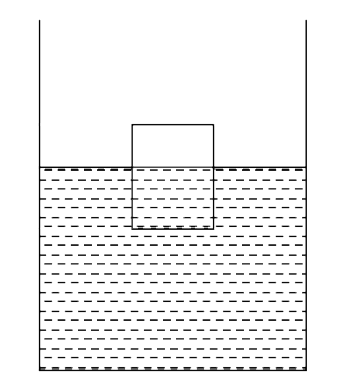The loss of weight of a solid when immersed in a liquid at 0∘C is W0 and at t∘C is 'W'. If cubical coefficient of expansion of the solid and the liquid are γs and γ1 then W=
W0[1+(γS−γL)t]
W0[1−(γS−γL)t]
W0[(γS−γL)t]
W0t/(γS−gammeL)
The correct Answer is:A
U0=V0σ0Lg=W0 and Ut=VtσtLg=W
WW0=VtV0×σtLσ0L=(1+γBΔθ)(1+γLΔθ)
=(1+γSΔθ)(1+γLΔθ)−1=1+γSΔθ−γLΔθ
=W=W0[1+(γS−γL)Δθ)]
=W0[1+(γS−γL)t]
Topper's Solved these Questions
- CALORIMETRYBOOK - CENGAGE PHYSICSCHAPTER - CALORIMETRYEXERCISE - Multiple Correct
25 Videos
- CALORIMETRYBOOK - CENGAGE PHYSICSCHAPTER - CALORIMETRYEXERCISE - Comprehension
30 Videos
- CALORIMETRYBOOK - CENGAGE PHYSICSCHAPTER - CALORIMETRYEXERCISE - Subjective
25 Videos
- BASIC MATHEMATICSBOOK - CENGAGE PHYSICSCHAPTER - BASIC MATHEMATICSEXERCISE - Exercise 2.6
20 Videos
- CENTRE OF MASSBOOK - CENGAGE PHYSICSCHAPTER - CENTRE OF MASSEXERCISE - INTEGER_TYPE
1 Video
Similar Questions
The loss of weight of a solid when immersed in a liquid at 00C is ΔW0. If α and β are the volume coefficients of expansion of the solid and the liquid respectively, then the loss of weight at t∘C is approxumately
View SolutionDensities of a liquid at 30∘C and 80∘C are 0.6gmcc and 0.54gmcc . The coefficient of real expansion of liquid is
View Solution
Knowledge Check
The density of a liquid at 100∘C is 8.0g/cm3 and at 0∘C is 8.4g/cm3, the coefficient of cubical expansion of the liquid is
A10−4/∘CB5×10−4/∘CC8×10−4/∘CD4×10−4/∘CA metal ball immersed in water weighs w1 at 0∘C and w2 at 50∘C. The coefficient of cubical expansion of metal is less than that of water. Then
Aw1>w2Bw1<w2Cw1=w?DData is insufficientWhy is it difficult to measure the coefficient of expansion ofa liquid than solid?
ALiquids tend to evaporate at all temperaturesBLiquids conduct more heatCLiquids expand too much when heatedDTheir containers also expand when heated
A beaker contains a liquid of volume V0. A solid block of volume V floats in the liquid with 90% of its volume submerged in the liquid. The whole system is heated to raise its temperature by Δθ. It is observed that the height of liquid in the beaker does not change and the solid in now floating with its entire volume submerged. Calculate Δθ. It is given that coefficient of volume expansion of the solid and the glass (beaker) are γs and γg respectively.

View SolutionA solid is immersed completely in a liquid. The temperature coefficients of volume expansion of solid and the liquid are γ1 and γ2(<γ1). If temperatures of both are increased, then match the following.
∣∣ ∣ ∣ ∣ ∣ ∣∣Table-1Table-2(A)upthrust on the solid will(P)increase(B)apparent weight of the solid will(Q)decrease(C)fraction of volume immersed in(R)remain samethe liquid if allowed to float will∣∣ ∣ ∣ ∣ ∣ ∣∣
View SolutionA solid body floats in a liquid at a temperature t=50∘C being completely submerged in it. What percentage of the volume of the body is submerged in the liquid after it is cooled to t0=0∘C, if the coefficient of cubic expansion for the solid is γs=0.3×10−5.∘C−1 and of the liquid γl=8×10−5.∘C−1.
View SolutionA metal ball immersed in water weighs w1 at 5∘C and w2at50∘C. The coefficient of cubical expansion of metal is less than that of water. Then
View SolutionAt 0.0C the densities of a cork and a liquid in which the cork floats are d1 and d2 respectively. The coefficient of expansion for the material of the cork and the liquid are γ and 100γ respectively. If the cork sinks when the temperature of the liquid is 't0C' then the ratio d2d1 is
View Solution
